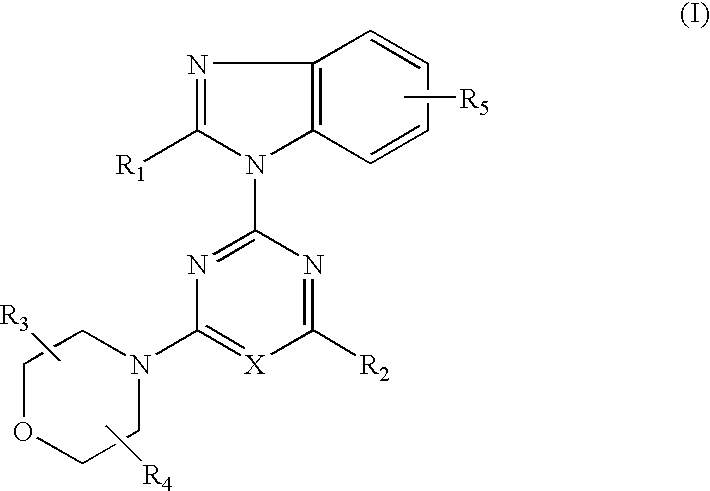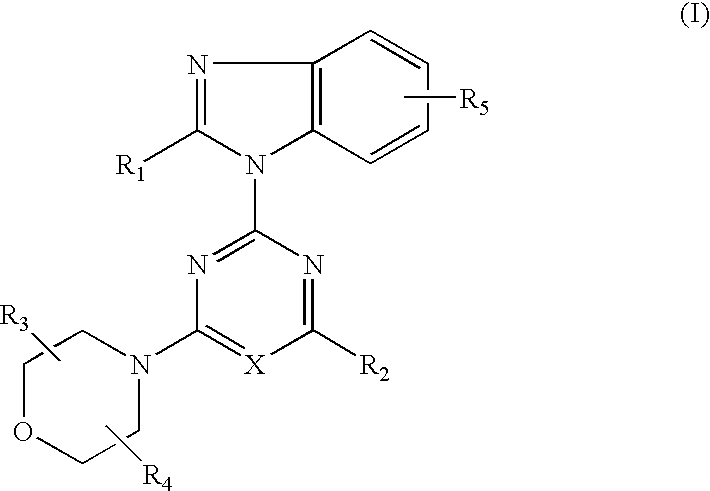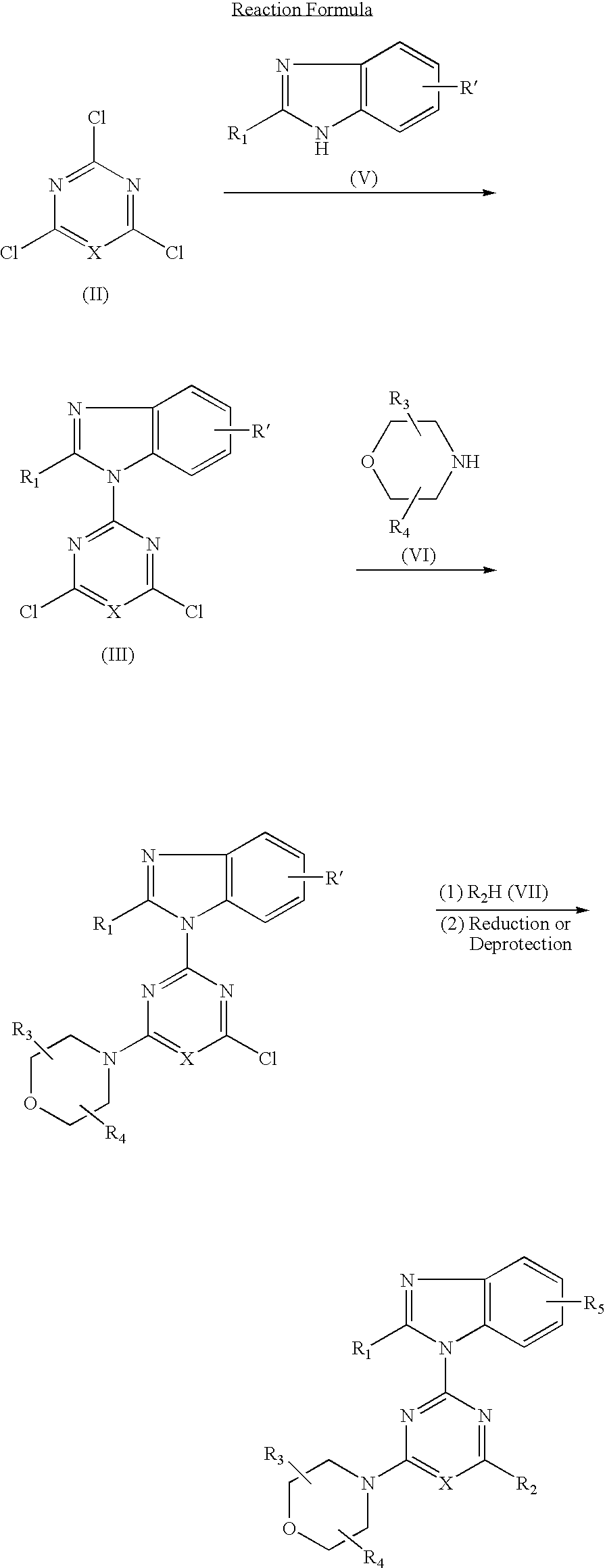Heterocyclic compound and antitumor agent containing the same as active ingredient
- Summary
- Abstract
- Description
- Claims
- Application Information
AI Technical Summary
Benefits of technology
Problems solved by technology
Method used
Image
Examples
example 1
2-(2-difluoromethylbenzimidazol-1-yl)-4-(cis-2,3-dimethylmorpholino)-6-morpholinopyrimidine (compound 1)
[0111](1) 0.84 g (5 mmol) of 2-difluoromethylbenzimidazole dissolved in DMF (25 ml) was added and reacted with 60% sodium hydride (0.24 g, 6 mmol) at room temperature for 30 minutes. This suspension was added to a solution of 2,4,6-trichloropyrimidine (0.92 g, 5 mmol) dissolved in DMF (25 ml) and stirred at room temperature for 1.5 hours. The reaction solution was poured into water and the resulting precipitates were recrystallized from methanol to obtain 0.98 g (yield: 62%) of 4,6-dichloro-2-(2-difluoromethylbenzimidazol-1-yl)pyrimidine.
(2) 0.32 g (1.0 mmol) of 4,6-dichloro-2-(2-difluoro-methylbenzimidazol-1-yl)pyrimidine, 0.16 g (1.0 mmol) of cis-2,3-dimethylmorpholine hydrochloride and 0.3 g (2.2 mmol) of anhydrous potassium carbonate were added to DMF (10 ml) and stirred at room temperature for 16 hours. The reaction solution was poured into water and extracted with ethyl acet...
example 2
2-(2-aminobenzimidazol-1-yl)-4-(cis-2,3-dimethyl-morpholino)-6-morpholinopyrimidine
[0140]In accordance with the procedure of the Example 1 except that 2-difluoromethylbenzimidazole in (1) of the Example 1 was replaced by 2-aminobenzimidazole, 27 mg (yield: 90%) of the titled compound was obtained as colorless crystals.
[0141]Melting point: 129–133° C.
[0142]NMR(CDCl3) δ: 1.20(3H, d, J=7 Hz), 1.23(3H, d, J=7 Hz), 3.2–4.2(14H, m), 5.43(1H, s), 6.62(2H, brs), 7.0–7.4(3H, m), 8.1–8.2(1H, m)
[0143]MS m / z: 409(M+)
[0144]In accordance with the procedure of the Example 2, the following compound was prepared from the corresponding starting material.
2-(2-aminobenzimidazol-1-yl)-4-(trans-2,3-dimethyl-morpholino)-6-morpholinopyrimidine
[0145]Melting point: 118–123° C.
[0146]NMR(CDCl3) δ: 1.36(3H, d, J=7 Hz), 1.39(3H, d, J=7 Hz), 3.3–4.2(14H, m), 5.42(1H, s), 6.63(2H, brs), 7.0–7.4(3H, m), 8.1–8.2(1H, m)
[0147]MS m / z: 409(M+)
example 3
4-(cis-2,3-dimethylmorpholino)-2-(2-hydroxymethyl-benzimidazol-1-yl)-6-morpholinopyrimidine (compound 10)
[0148]In accordance with the procedure of the Example 1 except that 2-difluoromethylbenzimidazole in (1) of the Example 1 was replaced by 2-tert-butyldimethylsilyloxy-methyl-benzimidazole, 1.62 g (yield: 80%) of 2-(2-tert-butyldimethylsilyloxymethylbenzimidazol-1-yl)-4-(cis-2,3-dimethylmorpholino)-6-morpholinopyrimidine was obtained. 1.62 g (3.0 mmol) of the obtained compound dissolved in THF (10 ml) was added with tetrabutylammoniumfluoride (1.18 g, 4.5 mmol) and stirred at room temperature for 30 minutes. The reaction solution was poured into water and dealt with in accordance with the procedure of (2) of the Example 1 and purified by column chromatography to obtain 0.86 g (yield: 67%) of the titled compound as colorless crystals.
[0149]Melting point: 125–128° C.
[0150]NMR(CDCl3) δ: 1.37 (3H, t, J=7 Hz), 1.39 (3H, d, J=7 Hz), 3.3–4.2(14H, m), 5.13(2H, s), 5.46(1H, s), 7.2–7.4(2H,...
PUM
| Property | Measurement | Unit |
|---|---|---|
| Mass | aaaaa | aaaaa |
| Molar density | aaaaa | aaaaa |
| Molar density | aaaaa | aaaaa |
Abstract
Description
Claims
Application Information
 Login to View More
Login to View More - R&D
- Intellectual Property
- Life Sciences
- Materials
- Tech Scout
- Unparalleled Data Quality
- Higher Quality Content
- 60% Fewer Hallucinations
Browse by: Latest US Patents, China's latest patents, Technical Efficacy Thesaurus, Application Domain, Technology Topic, Popular Technical Reports.
© 2025 PatSnap. All rights reserved.Legal|Privacy policy|Modern Slavery Act Transparency Statement|Sitemap|About US| Contact US: help@patsnap.com



